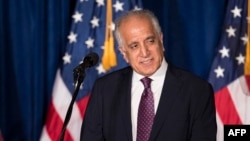A high-level U.S. diplomat responsible for negotiations with the Taliban made it clear the insurgent group would have to engage with the Afghan government if they wanted the peace process to move forward.
"The road to peace will require the Taliban to sit with the Afghan government. There is a consensus among all the regional partners on this point," Zalmay Khalilzad, the special representative for Afghanistan reconciliation, told a group of journalists Wednesday in Kabul.
The Taliban's refusal to engage directly with the sitting administration in Kabul seems to have become a stumbling block in negotiations that started last year, after U.S. diplomats gave in to a major Taliban demand and met them directly.
So far, the Taliban have held several meetings with the Americans.
The last significant round of talks between Khalilzad and the Taliban was held in December in Abu Dhabi, United Arab Emirates. Pakistan, Saudi Arabia and the UAE government also took part in those discussions.
The Afghan government sent a delegation in hopes of joining the talks, but the Taliban refused to meet them. Taliban statements describe members of President Ashraf Ghani's administration as "puppets" or "stooges" of the "invaders."
The next meeting, reportedly scheduled in Saudi Arabia earlier this month, was called off by the insurgent group after it came under pressure by the Saudi government to meet with representatives of the current Afghan government.
Earlier this week, Taliban spokesman Zabiullah Mujahid tweeted a statement saying the U.S. agreed last November to discuss "the withdrawal of foreign forces from Afghanistan and preventing Afghanistan from being used against other countries in the upcoming meeting."
The statement then claimed that the U.S. was unilaterally changing the agenda and warned that the negotiations could stall.
Responding to the statement, Khalilzad said, "If the Talibs want to talk, we can talk. If they want to fight, we can fight," adding that in the end, if the Taliban chose to fight, the United States would support the Afghan government.
Khalilzad, who is on a trip to the region that has included stops in China, India and the UAE, is expected to arrive in Islamabad next.
Lisa Curtis, the director for South and Central Asia at the U. S. National Security Council, is already in Islamabad as part of the interagency delegation traveling with Khalilzad.





